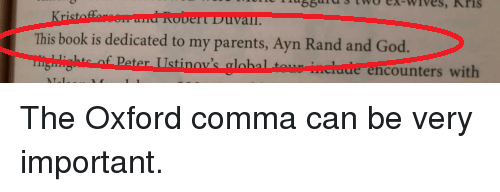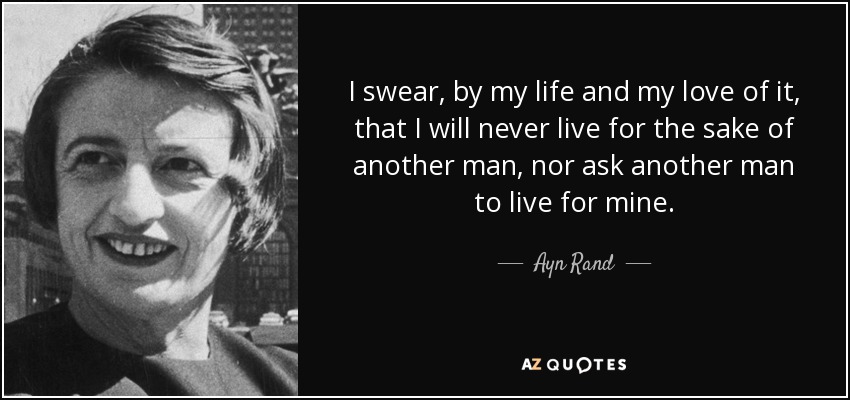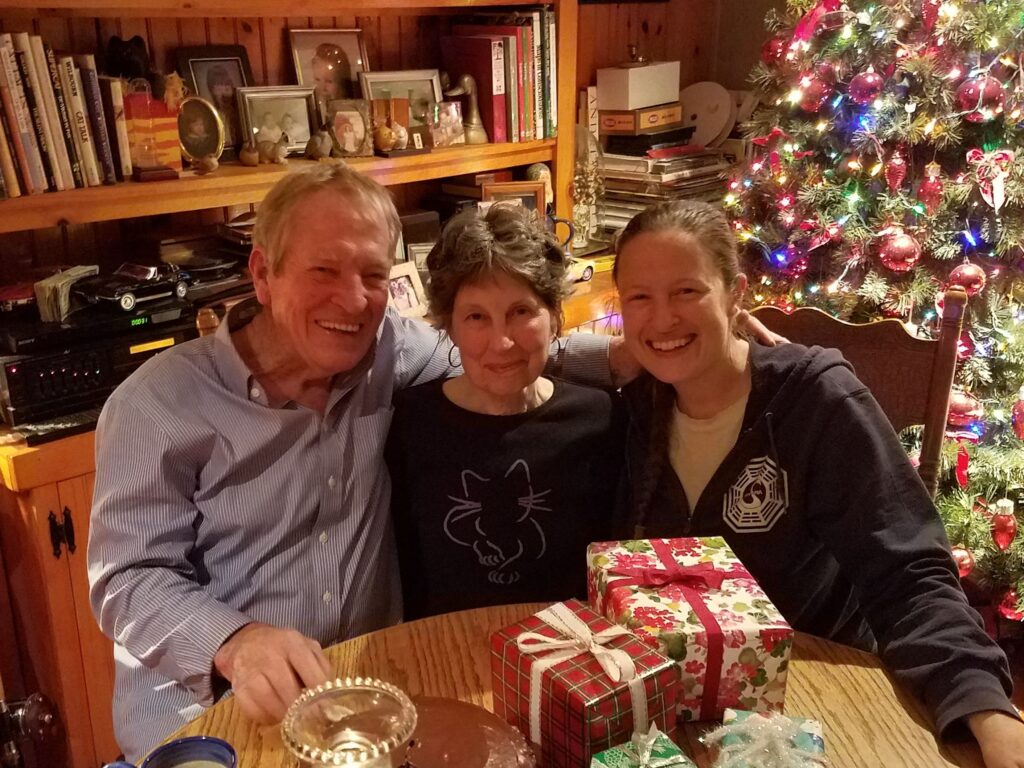Part 3 – Baggage and Expectations
I spent time talking to some very dear friends over the last few weeks to examine the ideas in this series about both Catholicism and Objectivism. I asked a lot of questions to make sure I was interpreting aspects of these philosophies correctly, but there were some questions they asked of me in return that really made me think: Why on Earth was I trying to compare the polar opposite figures of Ayn Rand and the Pope? Why was I so intent on clinging to her incredibly specific definition of selfishness? Was this deep dive into such disparate topics a way of dealing with an unresolved sore spot in my life?

Image adapted from: [1]
Personal Background
If we’re trying to understand my motivations behind the twists and turns this series has taken, let’s start with a little context of my own. I think Ayn Rand imprinted on me as much as she did because I discovered her at a very pivotal time in my life. That’s not exactly true: I had read The Fountainhead [2] and seen the first Atlas Shrugged movie [3] years prior, but they didn’t make much of an impression on me. Then I read Atlas Shrugged [4] (twice in a row – I’m not kidding) while I was transitioning out of an entwined toxic work environment and abusive personal relationship.[5] I firmly believe that the events in the book helped me recognize unhealthy patterns in my own life, which I have worked very hard to identify and avoid since then.
I very much saw bits of myself in the protagonist Dagny Taggart,[6] a determined woman who loved her work and was really good at holding things together with shoe string and duct tape as goalposts were constantly moved by others. I saw glaring similarities between perspectives held by and methods used by both the antagonists in Dagny’s life and the people surrounding me – making me feel scared, stupid, or guilty for things I had done or not done, as I tried desperately to give more and more of myself to regain their approval. (Their methods were the same; Dagny’s and my responses were not.) I was regularly called selfish and had my priorities called into question if I ever attempted to advocate for my own needs, which is probably why Rand’s dispassionate definition of selfishness has offered some level of mental safety, if not moral absolution, for me.
Since then I have attempted to live my life according to my own terms, not anyone else’s, and I am extremely reluctant to relinquish any hard-won agency I have. (Christian can tell you how long it took me to move past the declaration that I would never get married.) In the same vein, I have also frequently joked that there are people who absolutely need to read Atlas Shrugged (those who are taken advantage of) and people who should never read Atlas Shrugged (those who take advantage of others). I’m only half joking when I say that because I am truly bothered by the generally limited understanding of Objectivism (which I complained about in last week’s post),[7] as well as the frequent misunderstanding that Rand gives people a license to operate freely, to the detriment of others’ ability to pursue their own happiness. For the last time, she does not.

Image credit: [8]
Rand’s definition of “selfishness” tells me that as long as I am following my own dreams without harming anyone else, I don’t need to justify my decisions to anyone but myself. (I will point out that achieving this kind of Objectivist ideal is an ambitious goal for someone with a history of codependent relationships.) Perhaps my deeply ingrained need for approval is why I took such care to understand not just the context of the pope’s comment but also the nature of a possible broader Catholic definition of parenthood… and then took steps to further illustrate a corollary between my nonprofit work and the service of a religious order, if only to demonstrate that I’m following the rules after all (not really rules, nor are they mine) by parenting a company, if not a biological child. Again, I am making no attempt whatsoever to equate myself with a nun, at least not consciously – I can neither confirm nor deny the role of my subconscious in making a play for external approval.
A Touchy Subject
So let’s bring it back to the subject that got us here in the first place and why I’ve spent so much time examining it. There are a lot of societal expectations around procreating. I’ve been largely supported by family who want me to follow my own path, but neither have I been entirely insulated from pressures and questions, no matter how lovingly intended. I have no illusions that I can tie up this incredibly weighty subject in a tidy package after a few brief blog posts, particularly after bringing in two such infamously polarizing figures and their philosophies, and then adding my own baggage on top of that. I am clearly not unbiased, but neither am I going to make any kind of pronouncement about whether anyone should or shouldn’t have kids. It’s obviously an individual decision that requires a lot of careful thought and consideration. But we’ve come this far, so I do have some thoughts to share.
There are plenty of different reasons why someone may want to have kids, many of which are motivated by the desire to love and care for another human. Of course if someone is acting out of a sense of joy and excitement about expanding their family, that’s wonderful – Pope Francis and Ayn Rand would both approve of that! There are, however, other reasons that basically apply the fears of the parent to their future children in the form of obligations: having someone to take care of you when you get old, having someone to pay into social security by the time you’re old enough to collect, having someone who can figure out how to fix climate change, etc. If anything, these are examples of a non-Randian paradigm, as they place undue, unwarranted, and unfair expectations on a child that isn’t even here yet.
The urge to act out of one’s own fears is a factor, but the decision also gets tricky if someone is being influenced by some kind of obligation to their parents, or their society, or their religion, or their spouse. If any kind of external pressure plays a role in the decision-making process, I believe that it’s going to make it harder (though not impossible) for that person to act in an open, loving manner toward new members of the family. That doesn’t mean things can’t change over time, but there are many parent-child relationships that are fraught with senses of obligation and feelings of resentment, in both directions.

Photo credit: Christian Korey
One point I did not mention in last week’s post about Objectivist theory, but that is nonetheless interesting to bring up in this context, is that if someone is acting purely out of self interest, rather than bowing to external pressures, any beneficiary of their actions is absolved of any guilt or sense of obligation to reciprocate because the action was not done for them. Now, I know my parents are not objectivists, but I’m going to use them as an example anyway: they were just excited to have me and raise me, and they put no pressures or obligations on my shoulders that I had to adjust my life based on their desires in return for the sacrifices they made for me. (We’ve actually talked about this – I’m not just making it up.) I’ve made decisions in my life that were hard for them to stomach (such as moving five hours away), but they’ve also supported me in walking my own path. That doesn’t mean I don’t do things for them – but it’s because I love them, and I want to, not because I feel I have to.
~
It looks like what was originally intended to be one post is going to be four. I will do my best to wrap things up next week with a summary of moral development theory and by identifying any semblance of common ground that exists for Pope Francis, Ayn Rand, and now me.
Until then, have you wrestled with the question of having kids or have you always known what you’d do? If you had difficulty deciding, what ultimately got you to your answer? I’d love to hear about your own experiences below.
Thanks for reading!
[1] https://esmemes.com/i/among-those-interviewed-were-merle-haggards-two-ex-wives-kris-kristofferson-2269321
[2] https://www.goodreads.com/book/show/2122.The_Fountainhead
[3] https://www.imdb.com/title/tt0480239/
[4] https://www.goodreads.com/book/show/662.Atlas_Shrugged
[5] https://radicalmoderate.online/getting-out/
[6] https://www.cliffsnotes.com/literature/a/atlas-shrugged/character-analysis/dagny-taggart
[7] https://radicalmoderate.online/dink-life-part-2/
[8] www.azquotes.com/quotes/topics/egoism.html
2 Comments
Globepouncing · March 16, 2022 at 11:38 pm
We wrestled with the kid question, but location – and the economic effects thereof – was perhaps the key deciding factor. Knowing we can sustainably provide well made our bundle a go. This would not have been our situation if we were in the United States.
Our little one gives us joy beyond what we ever thought joy could be, but if others don’t wish to spawn? Don’t care and none of my business.
Similarly to what you described for yourself, I’ve experienced little-to-no pressure from the fam to do or not do this or that. Funny, though – five hours by car seems like a hiccup to us. Soon it’ll be only 6 hours by air and 2 by train!
I’d like to dedicate this comment to my parents, the Buddha and Toby the cat. Point made: Oxford commas for life. #Englishteacher
Alison · March 27, 2022 at 12:54 pm
I’m so happy to know you’re happy, and I have no doubt that you’ll continue to be an amazing dad.
I sometimes wonder if my decision would have been different if I had stayed in a country with a better support system for parents (especially moms), but I guess I’ll never know.
In any case, hooray for English teachers! We hope to visit you after your next move and meet your family 🙂